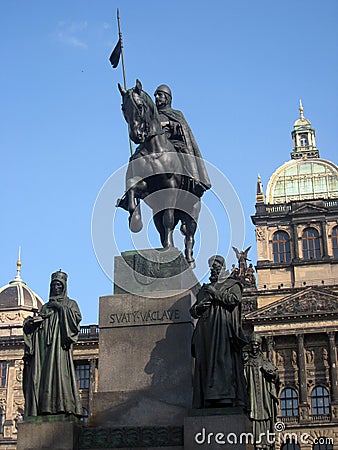Monday, March 23, 2015
When is a square not really a square....
Wencelaus Square is not really a square, but a long rectangle. At one end is the National Museum, a proud monument to Czech culture. At the other end is Na Prikope, a long sloping street. Once the former moat for the old city of Prague, the street encircles the old city with a string of temples to the gods of commerce, international corporations like Nike, Apple, H&M, Boss, Express.
This square which is not really a square is long enough for Soviet tanks to roll down in impressive array, as they did in 1968. This square which is not really a square is wide enough for the flames of Jan Palach’s self-immolation protesting the Soviet occupation to be seen at Na Prikope, the other end of the square. This square which is not really a square is vast enough to gather people, for whatever purpose they need to gather. In 1968 they demonstrated, ushering in the Prague Spring; in 1969 they watched silently, as a Prague winter descended; in 1989 they celebrated wildly, as Vaclav Havel, playwright not Soviet puppet, assumed the presidency. In 2015 they simply march from store to store, bags ever thicker with purchase.
A friend remarked: “The Communists were in power; they were all out for themselves. Now, the capitalists are in power; they too are all out for themselves. Nothing’s changed.”
But something has changed: capitalism will be harder to challenge. People wear the enemy on their feet; they march in shoes branded with swooshes. People write their screeds on computers bearing apples, the original fruit of temptation. Once a country filled with craftspeople, these former-craftspeople now work in a burgeoning “service economy,” importing their leather from Italy, their woolens from Bulgaria, and their woodcarving from Russia. Soon the Czech will import their glassware and crystal from -- Bangladesh?
A statue of King Wencelaus mutely surveys this latest occupation. Behind him is the Baroque façade of the National Museum, symbol of a culture that remains a political force more potent than weapons. After all, Jan Hus resisted Rome with the power of his preaching. Franz Kafka mocked in his fiction the very state he served as a functionary. Vaclav Havel, first president of the Czech Republic, was a playwright. Preacher and playwrights, artists and writers: traditionally they’ve served as the shock troops of Bohemia.
Were Wencelaus to lead them, how would he wage his campaign? Interviewing activist-writer-intellectual Ivan Klima after Havel re-established Czech independence in 1989, Philip Roth observed the change between Soviet occupation and this new independence: “For you, nothing was allowed, but everything mattered. Now you’re more like us: everything is allowed, nothing matters.” (Ivan Klima, The Spirit of Prague, Granta Books: 1994).
Subscribe to:
Post Comments (Atom)

No comments:
Post a Comment